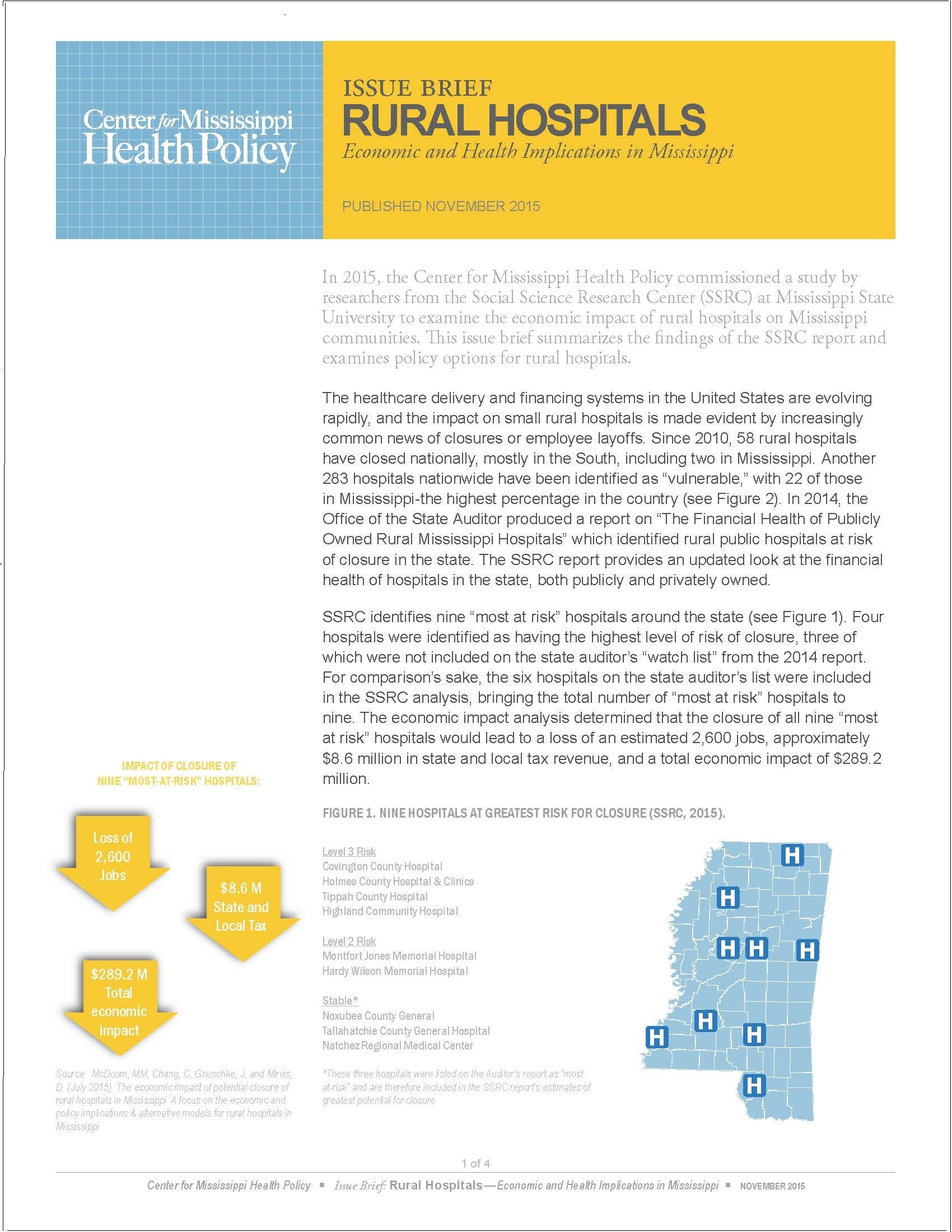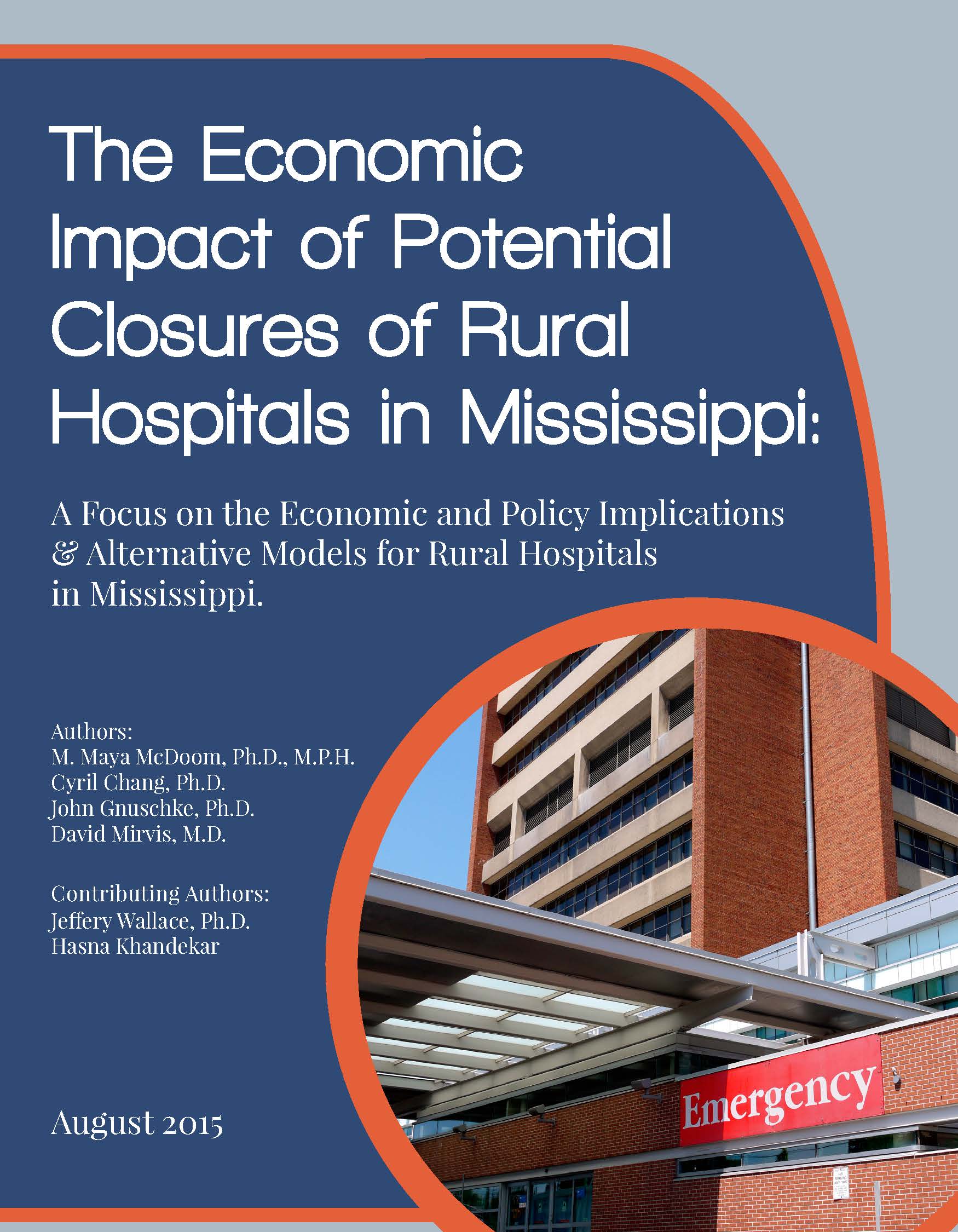Monday, July 8th, 2019
Freestanding Emergency Departments and Micro-Hospitals:
by Zach Smith
In a recent report by Navigant Consulting, 48% of Mississippi’s rural hospitals were rated as a high financial risk. The reasons for rural hospital closures in Mississippi, as nationwide, vary as do the possible solutions. Reasons for closures cited range from insufficient Medicare reimbursement rates to low admission volumes. Rural hospital closures create a void in geographic areas that force people to seek care elsewhere, extend travel times, and increase mortality for time-sensitive diseases. States have taken a variety of approaches to fill the gaps left by rural hospitals, including encouraging the growth of Freestanding Emergency Departments (FEDs) and micro-hospitals. These alternative models are relevant to Mississippi because they can be used to serve rural areas suffering from hospital closures, and Mississippi is not currently utilizing either model.
FEDs are medical facilities, owned or operated either independently or by hospitals, that provide emergency care at a physically separate location from a hospital. FEDs offer similar services to hospital emergency departments (EDs) and many can handle the same trauma and surgical services and are open 24/7. In some states, like Mississippi, FEDs can provide additional non-emergent services for those whom the FED may be the only accessible entry point into the broader healthcare system. FEDs have been identified as an efficient, safe, and cost-effective way to deliver emergency care, allowing for risk assessment and stabilization of ill or injured patients. Research has indicated that FEDs have the potential to improve access to emergency care, and they have emerged as a potential option to fill gaps in care created by rural hospital closures given that they can provide critical services in underserved areas.
The majority of states allow for some form of FED, including Mississippi, but FEDs are not without their drawbacks. FEDs are frequently associated with hospital-like facility fees similar to visiting an ED. In some cases, a visit to a FED can cost up to 10 times more than a comparable visit to a primary or urgent care facility. Unless they are owned or operated by a hospital, FEDs cannot bill Medicaid or Medicare. Research has shown that FEDs often locate in more affluent areas with substantially higher median incomes. In Dallas and Houston, the locations of FEDs have been shown to serve a less diverse population.
Currently, Mississippi law requires FEDs to be located at least 15 miles from the nearest hospital-based emergency room in a rural community where the Centers for Medicare and Medicaid Services (CMS) has revoked a rural hospital’s designation as a critical access hospital. According to the Mississippi State Department of Health’s Division of Licensure, the entity responsible for licensing healthcare facilities, Mississippi does not have any licensed FEDs operating in the state.
Freestanding and hospital emergency departments in the United States
SOURCE: Authors’ analysis of data on freestanding EDs gathered as of December 2015; and American Hospital Association Annual Survey Database, 2013.
In addition to FEDs, micro-hospitals have emerged as an option for rural areas by providing services similar to a hospital but with fewer inpatient beds. Micro-hospitals and FEDs are similar, but micro-hospitals provide inpatient services as well as emergency services and are fully licensed facilities. Micro-hospitals have been suggested as a potential complement to the FED model since they can provide inpatient services and a hospital license under which FEDs can bill Medicare and Medicaid. States like Arizona and Colorado have explored building CMS-recognized micro-hospitals with as few as eight beds using a “Hub and Spoke” model where subsidiary FEDs are placed in outlying underserved areas operating under the micro-hospital’s license.
The primary disadvantages of micro-hospitals are that they are limited to treating lower-acuity conditions compared to full-sized hospitals and they lack the ability to benefit from economies of scale enjoyed by larger hospitals. Additionally, CMS requires micro-hospitals to have the same minimum number of active inpatients as other hospitals. If micro-hospitals do not meet this inpatient threshold they are paid at a lower rate. Like FEDs, micro-hospitals are also more likely to locate in affluent areas with a fast-growing population. Mississippi does not have any specific regulations for micro-hospitals as a separate licensure category from a traditional hospital, so current full-scale hospital Certificate of Need (CON) and licensure requirements apply.
Research has shown that state policy, through licensure regulations and legislation, has a significant impact on the number and location of FEDs. Policy approaches taken by states vary widely depending on what each state sees as best for its population. Some states limit the amounts FEDs can charge for services, some require FEDs to operate at a minimum distance from a licensed hospital, and some states incentivize FEDs to locate in certain areas. State requirements for micro-hospitals can also either limit or encourage their growth.
Currently, Mississippi allows for licensure of FEDs with an emphasis on expanding access by requiring facilities to locate in rural areas, but does not have policies specific to micro-hospitals. If either of these models is to be considered as a potential option to meet health care needs of communities with failing or closed rural hospitals, the state should take advantage of the experience of the states who have been experimenting with these models and adopt policies that have been proven successful. Micro-hospitals and FEDs are just two of many alternatives, and research has indicated that other service delivery models may also serve communities well depending on their specific needs.



